- 22 minutes ago
- Europe
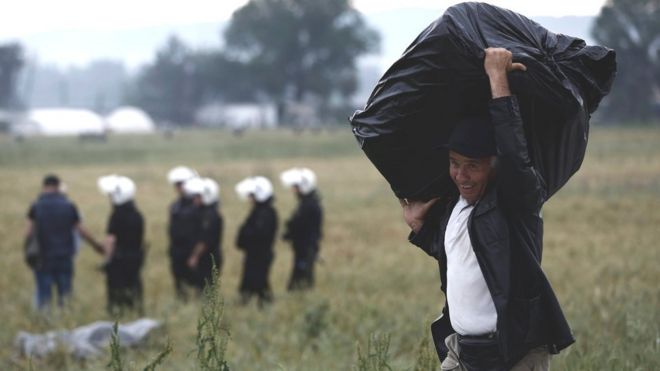 EPA
EPA
Thousands of stranded migrants are being evacuated from the makeshift Idomeni camp on Greece's northern border with Macedonia.
Most are being taken to specially designed processing facilities some 80km (50 miles) south, near Greece's second city, Thessaloniki.
Hundreds of riot police moved into the camp at dawn, but the authorities have stressed force will not be used.
The Greek-Macedonia border was closed in March.
Since then at least 8,400 people - many of them women and children - have remained stranded in the border area, having been prevented from continuing their journey to northern Europe.
At the scene: Yolande Knell, BBC News
A police helicopter has been circling overhead and we have seen riot police heading to the camp. But so far the situation appears calm and residents are leaving voluntarily. More than 10 buses have left with families on board.
Only journalists from Greek national television are being allowed to film the clearance operation. Others are being kept back at a roadblock along with some aid workers and a group of children's entertainers who used to organise activities at the camp. When the buses pass us, clowns jump up and down and dance at little refugee children who wave back.
Last week when we visited Idomeni camp, many expected this clearance operation. But they were reluctant to leave their location by the border gate with Macedonia, even though it has remained firmly closed since March.
Many of the migrants are from conflict zones in Syria, Iraq and Afghanistan. They have been living in tents, with little food to eat.
One Syrian, Rezan, who has been at the camp since early March, said that despite the poor conditions he did not want to leave - although he would if he had to.
"I prepared my bags. If they didn't use force, I will stay for a while, but if they use force, I didn't come here to fight anybody. I will just go. I escaped from Syria because I don't want to fight anybody," he told the BBC.
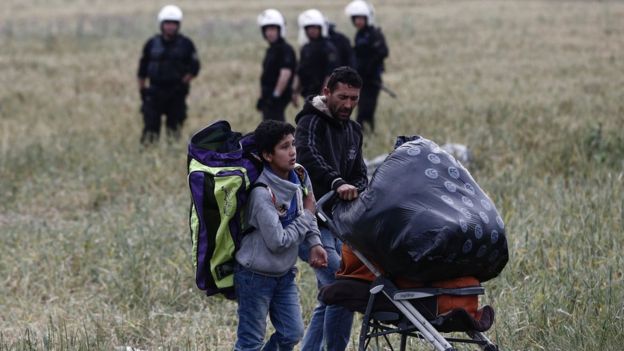 AFP
AFP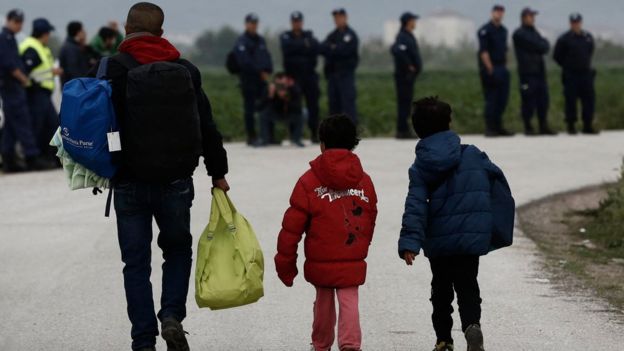 AP
AP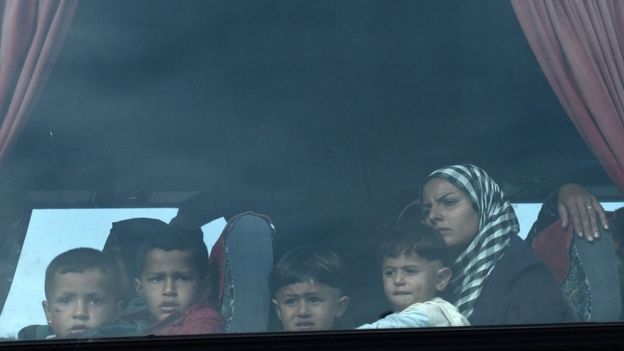 AP
AP
Stelios Kouloglou, of Greece's governing Syriza Party, told the BBC that the migrants needed to know there was no "short-term solution" to their situation, and they would be better off at what he called "hospitality centres".
Idomeni, he said, had become a "humanitarian and also social disaster", not only with "the problem of the health and the miserable conditions" but also of the emergence of gangs.
Giorgos Christides, a journalist at the camp for the German magazine Der Spiegel, told the BBC that police were determined to clear one part of the camp on Tuesday.
They plan to complete the operation within 10 days, he added.
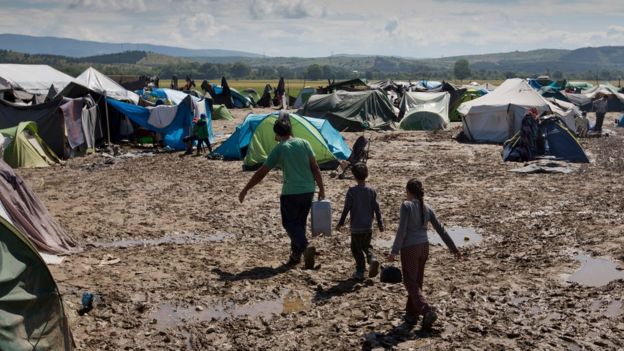 AP
AP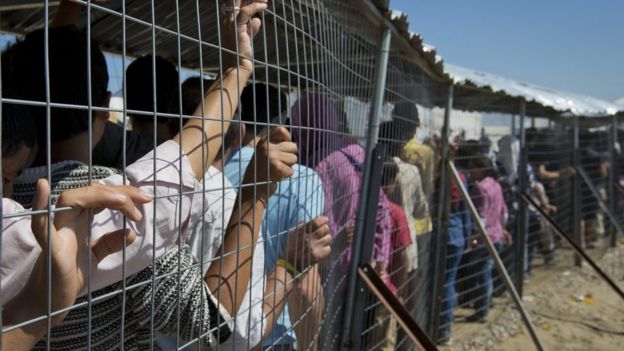 AP
AP
Also on Monday, police were reported to have started removing about 2,000 people who have been blocking the rail track on the border.
Migrants have blocked the tracks for more than a month, forcing trains to re-route further east through Bulgaria.
Macedonia closed its border with Greece to migrants in March after Austria announced it was tightening its own controls.
Since then, other Balkan countries have closed their own borders.
More than a million undocumented refugees and other migrants have entered the EU by boat from Turkey to Greece since early last year, generating an unprecedented crisis for the EU's 28 member states.
A note on terminology: The BBC uses the term migrant to refer to all people on the move who have yet to complete the legal process of claiming asylum. This group includes people fleeing war-torn countries such as Syria, who are likely to be granted refugee status, as well as people who are seeking jobs and better lives, who governments are likely to rule are economic migrants.
Are you in the area and affected by the issues raised in this story? Email ushaveyoursay@bbc.co.uk.
You can also contact us in the following ways:
- WhatsApp: +44 7525 900971
- Tweet: @BBC_HaveYourSay
- Send pictures/video to yourpics@bbc.co.uk
- Upload your pictures/video here
- Text an SMS or MMS to +44 7624 800 100 (international)
Or use the form below
- World on the move - BBC coverage as it happened
- Europe's migrant story enters new phase
- EU migration: Crisis in seven charts
- Migrants recount harrowing ordeal
- Turks look to EU to scrap visas for travel in Europe
- Where are drowned migrants buried?
- Migrant Crisis: Changing attitudes of a German city
- Fear and desperation at Idomeni crossing
- The migrants stranded in Greece
- Schengen: EU free movement deal explained
- In depth report
Video
In depth
- Turkey has European Union over a barrel
- The tricky business of solving Europe's migrant crisis
- EU-Turkey 'one-in one-out' migrant plan
- Migrant crisis: Have EU promises been kept?
- Why is EU struggling with migrants and asylum?
- How is migrant crisis dividing EU countries?
- Desperate migrants plead to escape 'hellish' Greek camp
- EU tensions as Turkey set to get visa waiver
- Migrant crisis: Who does the EU send back?
- Migrant attacks reveal dark side of Germany
- Cologne's profound impact on Europe

No comments:
Post a Comment